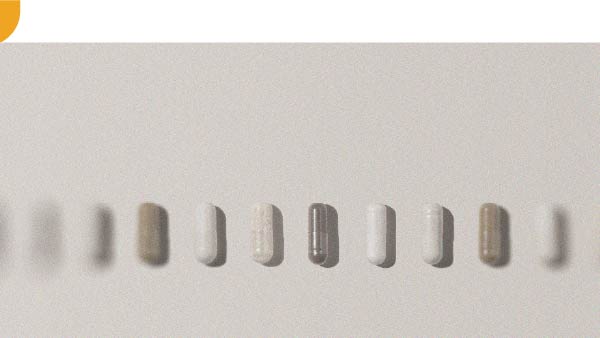When should you take an iron supplement?
According to the World Health Organization (WHO), two billion people across the world suffer from anaemia, which means they’re deficient in iron. But when and why should you start taking iron supplements? Here we provide some possible answers.

Causes and symptoms of iron deficiency
In theory, our diet provides all the iron we need to ensure good health. Offal, red meat, poultry, fish and seafood contain varying amounts of iron which are theoretically sufficient to ensure our bodies function properly. Pulses, dried fruit, green vegetables and nuts also contain significant levels of iron though this is absorbed less easily by the body.
In fact, iron from animal sources is absorbed by the body five times more effectively than that from plant sources! It’s also worth noting that vitamin C promotes iron absorption in the body.
However, genetic or circumstantial factors mean that many people are deficient in iron. In developed countries, it is mainly:
- children under 4;
- teenagers;
- women of child-bearing age;
- high-level sportspeople;
- vegans;
- and those suffering from stomach ulcers...
… who are affected by anaemia. Some because they are in a period of rapid growth, some due to blood loss from monthly periods (which can significantly affect iron levels in the blood), others because the growth of the placenta and foetus uses up iron, and others still because of the iron needed for intensive exercise.
Iron deficiency can cause a number of symptoms (1-2):
- fatigue;
- paleness;
- palpitations;
- reduced cognitive performance;
- weakened immune function, etc.
Iron supplements: an effective solution
Iron supplements offer a particularly effective response to these symptoms and are widely prescribed by doctors at many stages of life.
A course of iron supplements is thus often recommended for pregnant women and new-born babies. Following several studies suggestive of improved performance among high-level sportspeople, doctors frequently prescribe iron supplementation for such individuals. And finally, iron supplements are often recommended for children and adolescents to improve their intellectual performance.
And there’s a simple reason for this. Provided they’re dosed at a minimum of 2.1mg of iron per 100g (as is the case with our supplement Iron Bisglycinate), iron supplements support (3):
- normal energy metabolism;
- normal intellectual function;
- production of haemoglobin and red blood cells;
- transport of oxygen around the body;
- normal immune system function;
- a reduction in fatigue;
- normal child mental development;
- cell division.
And this is the case even when blood tests show only a moderate level of anaemia. Supplementing with iron thus solves many problems and provides numerous benefits.
The danger of too much iron
While a lack of iron, or anaemia, is responsible for many diseases and must be addressed with appropriate supplementation, excess iron in the body also poses a risk to health.
Iron actually accumulates in the body and can cause moderate to severe poisoning, depending on the amount absorbed:
- abdominal pain;
- constipation;
- diarrhoea;
- nausea;
- vomiting;
- joint pain, etc.
It’s therefore vital that any decision to take iron supplements is not based entirely on symptoms of iron deficiency as these are common to many other deficiencies too!
The decision to supplement with iron must only be taken after a blood test to confirm your iron levels. Obtaining medical advice before starting a course of iron supplements is therefore essential.
If you have trouble concentrating or are suffering from chronic fatigue, you may also want to consider taking a vitamin C supplement (for example Liposomal Vitamin C). In the same vein, you could also try a multivitamin complex (such as Daily 1®), which may contain vitamin C, but also many other nutrients like magnesium and selenium.
References
- https://www.who.int/nutrition/topics/ida/fr/#:~:text=Les%20chiffres%20sont%20impressionnants%3A,aggrav%C3%A9e%20par%20les%20maladies%20infectieuses.
- https://eurekasante.vidal.fr/parapharmacie/complements-alimentaires/fer.html
- EU Register on nutrition and health claims, EFSA, 2014
2 Days
The delivery was fast and the product…
The delivery was fast and the product is great
SOMMARIVA Gianni
4 Days
Great service and lots of information
Great service and lots of information
Gabi
7 Days
Service Satisfaction
I’m satisfied with the service; it fulfilled what it set out to do.
Anfhony Abreu
10 Days
Original product and fast delivery
Original product and fast delivery. I haven't started it yet, but will do soon.
Vincenza Catania
12 Days
Good quality
Good quality. Good service.
Leonel Guzman
14 Days
Top!!!!!!!!
Top!!!!!!!!
Michael
16 Days
Excellent!
Products are great and delivered fast!
PARDINI Debora
17 Days
From order to receive the product
From order to receive the product, the process is smooth & fast. It’s good to customers.
WONG Mei Ling
18 Days
Fast delivery
very quick delivery to italy. product is good.
Customer
19 Days
Prompt delivry !!👍
Prompt delivry !!👍
SWEET Christine
20 Days
Good delivery and flawless quality
AS far as delivery and the visual quality are concerned, Supersmart is excellent. I will not comment on the efficacy of the products themselves, since that is only possible over a longer period and in a large customer base compared to people who do not consume a particular product.
Roger De Backer
21 Days
Perfect services
Perfect services, perfect support, great articles about products
Michaela Alali Beitlová
21 Days
Great experience and effective supplements
I’ve purchased many types of supplements from this company over the course of years to treat a few issues, and I’m satisfied with their quality. After using them consistently for a period of time, I can say they met my expectations and I could feel real health benefits that built up over time. Deliveries are always quick. I recommend this company to anyone looking for high-quality supplements.
Giordano
21 Days
Es hat alles gestimmt
Es hat alles gestimmt. Top
marina thieme
25 Days
Great product
Great product, but still evaluating its effectiveness. Highly recommended. Super efficient delivery.
Chalise
of experience
your money back
##montant## purchase



